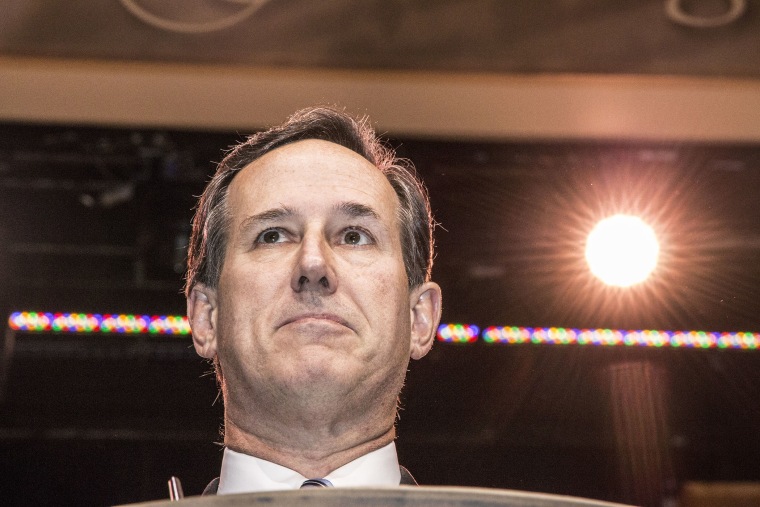Several Republicans eyeing a 2016 presidential run have raised eyebrows recently with surprising comments on lightning rod issues like voter identification laws, minimum wage and climate change. The comments reflect both the fractured Republican coalition and the efforts by at least some of the hopefuls to grow the party base.
Take former Pennsylvania Sen. Rick Santorum, who is insisting that his party’s stance against raising the minimum wage “makes no sense." Santorum, who ran unsuccessfully for the party's nomination in 2012, points to polls that show the vast majority of Americans strongly support a hike from $7.25 an hour to $10.10. The party’s stance of not even considering an increase runs counter to its claims that the GOP is fighting for working class Americans, Santorum says.
“Let’s not make this argument that we’re for the blue collar guy but we’re against any minimum wage hike ever,” Santorum told msnbc.
Then there’s Sen. Rand Paul of Kentucky, who last week came out against his party’s push for strict voter identification laws. The Tea Party favorite toldThe New York Times that such initiatives are “offending” minorities and that his party shouldn’t go “too crazy” on the issue. Conservative proponents of voter ID laws argue that such rules are necessary to cut down on voter fraud, while critics say such laws serve to exclude the poor and minorities, who are more likely to not have a government-issue ID (and are more likely to vote Democratic).
And finally Sen. Marco Rubio of Florida, who this weekend pushed back on overwhelming scientific evidence to announce that he doesn’t believe human activity causes climate change. His remarks came just days after a White House report insisting climate change is a potentially catastrophic reality being hastened by human behavior.
But Rubio insisted Sunday on ABC’s This Week: “I don’t agree with the notion that some are putting out there, including scientists that somehow there are actions we can take today that would actually have an impact on what’s happening in our climate.” He added: “Our climate is always changing.”
So what's the strategy behind such positioning?
Santorum, who is viewed primarily as a social conservative, is now trying to stake out a broader, more populist message. He's promoting a new book to that effect -- “Blue Collar Conservatives: Recommitting to an America That Works.” It's not an entirely new focus for Santorum -- in the 2012 campaign, frequently tried to distinguish himself from wealthy frontrunner Mitt Romney by pointing to his own blue collar upbringing. He's also fighting the perception among voters that Republicans are the party of the rich.
Santorum is “anticipating if he were to win a nomination, it’s something he can say he reached across the aisle on,” said conservative strategist Keith Appell of a minimum wage hike. He warned, however, that it’s a risky strategy. “So much of the rank-and-file Republican base, the conservative grass roots and even Tea Party supporters are business people,” said Appell, citing the common argument on the right that an increased minimum wage would hurt small businesses.
For Paul, it's about moving the GOP to grow beyond its overwhelmingly white, older demographic and gradually loosening the Democratic Party's strong dominance among minority voters. Paul isn't necessarily the best messenger for the cause, but he's recognizing the fact that no Republican can win the White House unless the party begins to reflect the nation's changing demographics.
Paul is “trying to prove to donors that he can have general election appeal," said GOP strategist Ford O’Connell. Appell added that Paul may be trying to assure Americans he’s trustworthy on issues of race given his past controversial remarks.
Rubio's comments reflect a move to re-impress the GOP base. As msnbc has noted, most Republicans who want to be taken seriously in a general election tend to avoid making such controversial statements about climate change, as polls indicate that Americans believe human-included global warming is a very real thing. But because of his push for immigration reform in the Senate, support for Rubio –once seen as the golden boy of the GOP – has been on the decline, something the Sunshine State lawmaker shrugged off over the weekend, insisting he doesn’t pay attention to surveys.
“He needs to improve his conservative bonafides. As far as the base is concerned, he tripped and fell on immigration,” said O’Connell.
It's crucial for Republican candidates to develop an identity as early as possible. Unlike the Hillary Clinton-dominated Democratic presidential speculation, the Republican field is far more crowded. The latest RealClearPolitics average of 2016 polling data shows Paul and former Arkansas Gov. Mike Huckabee tied at 13% support. Meanwhile, former Florida Gov. Jeb Bush is in a close second at 12.3% followed by New Jersey Gov. Chris Christie (10.7%), Wisconsin Rep. Paul Ryan (10.5%), Sen. Ted Cruz of Texas (6.7%), Rubio (6.5%), Texas Gov. Rick Perry (4.4) and Santorum (3.3%).
“Should they run, they recognize there’s a lot of people running,” said O’Connell. “They’re all trying to expand their appeal to voters, albeit in different ways.”
